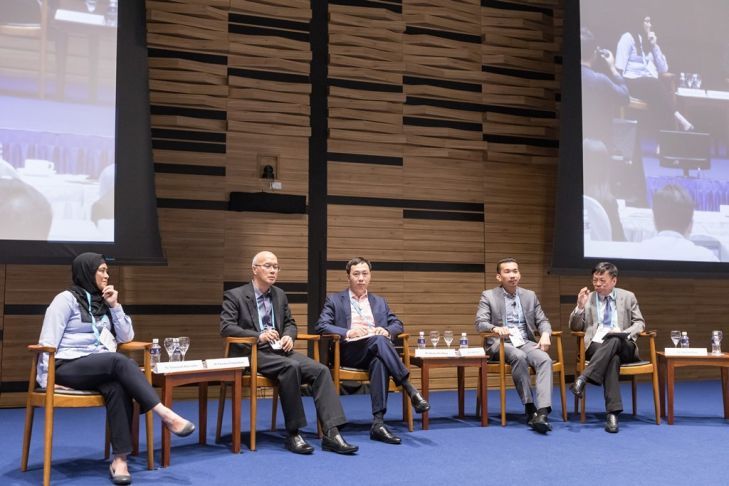
“What are the challenges in integrating technical and social disciplines into a single research project?” “How can the ASEAN Smart Cities Network be successfully implemented?” “How can universities and the public sector work better together?”
These were some of the issues discussed at the QS in conversation jointly organised by Quacquarelli Symonds and SMU on 3-5 October 2018.
Themed “University-Public Sector Partnerships: Smart Cities”, the event was hosted by SMU and attracted about 200 participants from across the ASEAN region and beyond.
This seminar brought together prominent academics and experienced public sector leaders who shared their experiences and insights on how universities can develop new capabilities and engage governments to drive impactful projects. It showcased successful examples of how universities, government agencies and other organisations are collaborating to leverage data-driven systems to power the rapidly changing landscapes of Smart Cities, and highlighted lessons learned from these efforts.
In his address at the Welcome Dinner on 3 October, SMU President Professor Arnoud De Meyer said that universities have a unique role to play in the development of smart cities. “Research universities have the physical and human resources to help their cities meet complex urban challenges through undertaking research, development, and deployment of innovative projects at lower cost.
“By working closely with businesses and local government, universities can help to develop and test new technologies, turn ideas into prototypes and unlock and analyse urban data for the good of a city’s citizens whilst delivering digitally savvy graduates to the workplace. It is a symbiotic lifecycle where urbanisation drives the demand for education because of the higher-level skills requirement of the economy, whilst education drives urbanisation because urban centres are where educated and skilled people choose to live and find work,” he said.
SMU Provost Professor Lily Kong shared in her introductory remarks on 4 October about the Smart-City Management & Technology major launched by School of Information Systems in collaboration with School of Social Sciences in 2017. This unique interdisciplinary programme will enable SMU students to “appreciate the social, governance and economic challenges of urbanisation; understand the role of technology in enabling smart city; and apply appropriate technologies to address urbanisation challenges and deliver solutions and services that improve the lives of citizens.”
In June 2018, Prof Kong had signed a Memorandum of Agreement for an accelerated Bachelor-to-Master progression opportunity between SMU’s School of Information Systems and University College London's Bartlett Centre for Advanced Spatial Analysis. This is a first for the new Smart-City Management & Technology major, providing SMU students of this new major an integrated progression from our Bachelor degree to a Master degree that focuses on Smart Cities and Urban Analytics.
The seminar proper started with a fireside chat with Guest-of-Honour Dr Janil Puthucheary,
Singapore Senior Minister of State, Ministry of Transport and, Ministry of Communications and Information, and Minister-in-Charge of Government Technology Agency, which was moderated by Professor Steven Miller, SMU’s Vice Provost (Research).
The keynote speakers at the seminar were Professor Ramayya Krishnan, Dean of the Heinz College of Information Systems and Public Policy at Carnegie Mellon University, Pittsburgh, USA; Professor Mark Fox, Associate Director for Research of the School of Cities at the University of Toronto, Canada; Professor Hiroshi Esaki of the Graduate School of Information Science and Technology at the University of Tokyo, Japan; Professor Caroline McMillen, Vice-Chancellor and President at University of Newcastle, Australia and Councillor Nuatali Nelmes, Lord Mayor of Newcastle, Australia; Mr Tan Kok Yam, Deputy Secretary, Smart Nation and Digital Government Office, Singapore, as well as Professor Steven Miller, Vice Provost for Research at SMU. They shared about the smart city efforts in the United States, Canada, Japan Australia and Singapore respectively.
Besides the keynote presentations, there were three panel discussions. The first was moderated by Mr Ong Eng Kian, Director, Centre for Liveable Cities, Singapore. Members of the panel, who shared their views on the ASEAN Smart Cities Network, were Ms Maimunah Jaffar, Head of Department, Planning & Compliance, Iskandar Regional Development Authority, Malaysia; Dr Passakon Prathombutr. Senior Executive Vice President/CTO, Digital Economy Promotion Agency and Chief Smart City Officer of Phuket, Thailand; Mr Dương Hải Hưng, Deputy Director General, ASEAN Department Ministry of Foreign Affairs, Vietnam; and Mr Vannak Seng, Chief of Administration, City Hall of Phnom Penh, Cambodia.

Caption: Professor Archan Misra (extreme right) from SMU School of Information Systems moderated a panel discussion comprising (L-R) Professor Caroline McMillen, Councillor Nuatali Nelmes, Professor Ramayya Krishnan, Professor Mark Fox, and Professor Hiroshi Esaki.
Another panel, moderated by Professor Archan Misra, Associate Dean (Research), SMU School of Information Systems, discussed about navigating the risks and pitfalls of smart city collaborations. The panel members were Professor Ramayya Krishnan, Professor Mark Fox, Professor Hiroshi Esaki, Professor Caroline McMillen, and Ms Nuatali Nelmes.

Caption: Dr Katharina Lange (extreme right), Executive Director of SMU Executive Development, moderated a panel discussion comprising (L-R) Professor Steven Miller, Mr Tan Kok Yam, Ms Jyoti Shukla and Associate Professor Kwon Young-Sang.
The third panel, moderated by Dr Katharina Lange, Executive Director of SMU Executive Development, discussed about “Engaging the private sector in university-public sector Smart City partnerships”. The panel members were Professor Steven Miller, Vice Provost (Research)
Singapore Management University; Mr Tan Kok Yam, Deputy Secretary, Smart Nation and Digital Government Office, Singapore; Ms Jyoti Shukla, Director, The World Bank; and Associate Professor Kwon Young-Sang, Associate Professor of Urban Design, Department of Civil and Environmental Engineering, Seoul National University, South Korea.
More information on the seminar proceedings can be found in the articles enclosed below.
Universities and governments: Partnering for possibilities
https://research.smu.edu.sg/news/2018/nov/20/universities-and-governments-partnering-possibilities
The smart city – no risk, no reward
https://research.smu.edu.sg/news/2018/nov/20/smart-city-no-risk-no-reward
Setting the pace of public-private partnerships
https://research.smu.edu.sg/news/2018/nov/20/setting-pace-public-private-partnerships
Featured photo: (L-R) Ms Maimunah Jaffar from Malaysia, Dr Passakon Prathombutr from Thailand, Mr Dương Hải Hưng from Vietnam and Mr Vannak Seng from Cambodia discussed the ASEAN Smart Cities Network at a panel moderated by Mr Ong Eng Kian, Director of Centre for Liveable Cities, Singapore.